|
|
|
Sort Order |
|
|
|
Items / Page
|
|
|
|
|
|
|
| Srl | Item |
| 1 |
ID:
087874
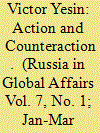

|
|
|
|
|
| Publication |
2009.
|
| Summary/Abstract |
Washington's plan to deploy a European segment of its missile defence system is a most sensitive issue and a major pet peeve of Russia - U.S. relations. Many observers agree that the ability of the sides to find a compromise solution to this problem would be indicative of the prospects for bilateral ties in the years to come.
PASSIONS OVER THE THIRD POSITION AREA
The planned third position area of a U.S. global missile defence system would include silos with interceptor missiles in Poland (the Ustka military range near the town of Slupsk in Pomeranian Voivodeship) and a missile defence radar in the Czech Republic (the Brdy military area near Jince, 60 km south-west of Prague). The first and second position areas of the ground-based echelon of the U.S. strategic missile defence system are deployed on the territory of the United States - in Fort Greely, Alaska and at Vandenberg Air Force Base, California, respectively.
The decision made by Washington in late 2005 to deploy a third position area near Russia's western border was taken by Moscow as a threat to its national security. (For more on this subject, see "Missile Defence Challenges" by Pavel Zolotarev in Russia in Global Affairs, N 3, July-September 2008.) To allay Moscow's fears, the George W. Bush administration made several attempts between 2006 and 2008 to convince the Russian leadership that the third position area was not directed against Russia.
|
|
|
|
|
|
|
|
|
|
|
|
|
|
|
|
| 2 |
ID:
086347
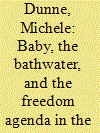

|
|
|
|
|
| Publication |
2009.
|
| Summary/Abstract |
In reassessing how to secure U. S. interests while stabilizing the Middle East, the new U.S. administration might well decide to postpone or even repudiate democracy promotion. Democratic systems have hardly bloomed in the region since President George W. Bush announced a "forward strategy of freedom" during a speech commemorating the twentieth anniversary of the National Endowment for Democracy in November 2003.1 In fact, U.S. attention seems to have caused more problems than it solved, particularly in Iraq and Palestine. No one can guarantee that the United States can promote democracy in the Middle East without risking stability and critical interests, making it tempting to at least try to set aside the policy until clearer answers emerge, potentially under the guise of a policy review.
|
|
|
|
|
|
|
|
|
|
|
|
|
|
|
|
| 3 |
ID:
086824
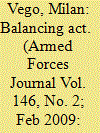

|
|
|
|
|
| Publication |
2009.
|
| Summary/Abstract |
U.S. Nuclear-Powered Attack Submarines (SSNS) are key elements of the Navy's striking power.They were critical during the Cold War and still play a vital role in the Navy's ability to obtain, maintain and exercise sea control.
|
|
|
|
|
|
|
|
|
|
|
|
|
|
|
|
| 4 |
ID:
148336
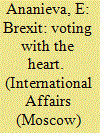

|
|
|
|
|
| Summary/Abstract |
A "POLITICAL TSUNAMI," an "existential crisis" and "the not so United Kingdom" are several of the many assessments the British media used to comment on the results of the June 23, 2016 EU referendum. The nation was invited to give a simple and unequivocal answer to a far from simple and far from unequivocal question very much like the one addressed to Greek philosopher Menedemus in the 3rd century B.C. whether "he had left off beating his father."
|
|
|
|
|
|
|
|
|
|
|
|
|
|
|
|
| 5 |
ID:
162105
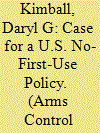

|
|
|
| 6 |
ID:
174121
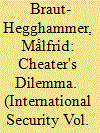

|
|
|
|
|
| Summary/Abstract |
Between the 1991 Gulf War and the U.S.-led invasion in 2003, the Iraqi regime faced a cheater's dilemma: how much should it reveal of Iraq's weapons of mass destruction (WMD) capabilities when each additional revelation made it less likely that the country would be rewarded, while continued denial also prevented the lifting of sanctions. The Iraqi leadership struggled to resolve this dilemma, as elites pursued competing policies and subordinates did not consistently obey Saddam Hussein's orders. These difficulties reflected principal-agent problems that were aggravated by the leadership's initial attempts to deny and cover up Iraq's WMD capabilities. Together, the cheater's dilemma and principal-agent problems explain a range of puzzling Iraqi behaviors that came across as calculated ambiguity to the outside world. These findings offer insights into the incentives and constraints that shape how other authoritarian regimes respond to external pressures to eliminate their WMD, and the extent to which they are willing and able to disclose information about past programs and their past efforts to conceal this information from the outside world.
|
|
|
|
|
|
|
|
|
|
|
|
|
|
|
|
| 7 |
ID:
156937
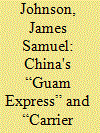

|
|
|
|
|
| Summary/Abstract |
A new generation of stealthier, supersonic, autonomous, and increasingly survivable Chinese anti-ship missiles (ASMs) with extended ranges, payloads, and accuracy are increasingly adept at evading U.S. defenses, and undermine the effectiveness of its surface fleets and carrier strike groups in the West Pacific. This article conceptualizes the evolution of Chinese ASMs through a structural-realist theoretical lens. It argues that the development and diffusion of these asymmetric precision-strike weapons have in important ways intensified U.S.-China security-dilemma dynamics, which could portend a paradigm shift (or at least the perception of one) in the future military balance of power in Asia.
|
|
|
|
|
|
|
|
|
|
|
|
|
|
|
|
| 8 |
ID:
147401
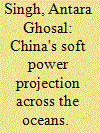

|
|
|
|
|
| Summary/Abstract |
At a time when the focus of most of the academic research on China is on the geopolitical developments in the South China Sea and the panning out of the United States' “next phase of rebalance strategy” in Asia, this paper draws attention to China's charm offensive across the Atlantic. It explores the political undertones of China's soft power push in the developed western world, especially in the context of its evolving relationship with the United States. In the final section, the paper tracks the implication of these developments on India and Indian policymaking.
|
|
|
|
|
|
|
|
|
|
|
|
|
|
|
|
| 9 |
ID:
175969
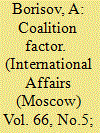

|
|
|
|
|
| Summary/Abstract |
HISTORY knows any number of fantastic metamorphoses, when adversaries or even enemies became partners and even allies (or vice versa), of which the anti-Hitler coalition of the Soviet Union, United States and Great Britain during the Great Patriotic War (1941-1945) and their collective contribution to the victory over fascism are the greatest examples. Having approached the critical point in history, the leaders of the coalition members - Stalin, Roosevelt and Churchill - demonstrated a lot of wisdom. They pushed aside the enmity and mistrust of the prewar years to close ranks in the face of the threat from the bloc of aggressor states.
|
|
|
|
|
|
|
|
|
|
|
|
|
|
|
|
| 10 |
ID:
193069
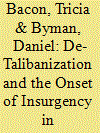

|
|
|
|
|
| Summary/Abstract |
This article examines the reasons for the rise of the Taliban and the onset of the insurgency in Afghanistan after the 2001 U.S. invasion, using counterfactual and path dependence analysis to bolster its arguments. We argue that the U.S. decision to de-Talibanize was a critical juncture, after which the rise of insurgency was far harder to prevent. The total rejection of the Taliban translated into the under-representation of Pashtuns in the Afghan government, delivering power to ethnic minorities at their expense. De-Talibanization led the United States to support strongmen to hunt the Taliban, but they were predatory, creating grievances that the Taliban exploited to recruit. Finally, de-Talibanization led many Taliban to flee to Pakistan, pushing them into the country most opposed to Afghanistan new political order. The lessons of the U.S. experience in Afghanistan suggest the necessity of a strategy for managing defeated enemies after an initial military victory.
|
|
|
|
|
|
|
|
|
|
|
|
|
|
|
|
| 11 |
ID:
157700


|
|
|
|
|
| Summary/Abstract |
RONALD R. KREBS reviews Richard Haass’ new book, A World in Disarray, which makes the case for U.S. leadership in constructing a new legitimate world order. He argues that Haass’ vision is driven by nostalgia for a world that never existed and that it warrants caution: world-shaping ambitions have proven extremely costly.
|
|
|
|
|
|
|
|
|
|
|
|
|
|
|
|
| 12 |
ID:
086127
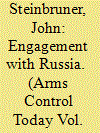

|
|
|
|
|
| Publication |
2009.
|
| Summary/Abstract |
The U.S. security relationship with Russia is a matter that is more significant to the U.S. government and the American people than was apparent during the presidential election. Elections are primarily about attitudes. The exercise of power is about the management of consequences.
As Barack Obama assumes the burdens of the presidency, he will acquire direct responsibility for the fact that the nuclear deterrent force operated by Russia represents by far the greatest physical threat to the United States and the only one that might plausibly put the viability of our society into immediate question. He will need to be continuously aware that he alone bears direct responsibility for managing that situation under our constitutional system. No one can contest or share his exclusive authority on the basis of experience, institutional position, personal stature, or anything else.
|
|
|
|
|
|
|
|
|
|
|
|
|
|
|
|
| 13 |
ID:
188119
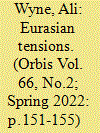

|
|
|
|
|
| Summary/Abstract |
With tensions over Ukraine growing, the Biden administration finds itself confronting a similar charge to one that dogged the Obama administration in the run-up to and aftermath of Russia’s annexation of Crimea: namely, that it is exhibiting weakness that could embolden Moscow and other discontents of the post–Cold War settlement. This judgment overstates U.S. agency while discounting the competitive challenges confronting Russia and China.
|
|
|
|
|
|
|
|
|
|
|
|
|
|
|
|
| 14 |
ID:
166119
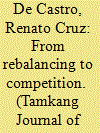

|
|
|
|
|
| Summary/Abstract |
During his two terms as U.S. president, former President Barack Obama made the Asia- Pacific region the focal point of American strategic attention. In November 2011, he announced the U.S. pivot to Asia. His goal was to constrain China from easing out the U.S. as East Asia's strategic offshore balancer. Contrary to expectations, the 2016 election of Donald Trump, did not spell the end of the strategic rebalancing to Asia. For the Trump Administration, the Asia-Pacific remains a top security priority for two reasons. One, North Korea's nuclear weapons program poses a clear and present danger to the U.S. and its allies in Northeast Asia. And two, China's naval expansion, island-building activities, and militarization efforts in the South China Sea threaten not only the freedom of navigation but also the rules-based international order. In conclusion, the article argues that there is a great deal of consistency between the Obama Administration's strategic rebalancing and the Trump Administration's emerging Indo-Pacific Strategy. However, the current administration's Indo-Pacific strategy reflects both continuity as well as discontinuity with its predecessor's rebalancing policy. On the one hand, neither U.S. national security interests nor Asia's importance to Washington has changed in the Trump Administration. On the other hand, its policy also reflects discontinuity as it characterized China as a threat to U.S. interests and is geared to engage this emergent power in a long strategic competition in the Indo-Pacific region.
|
|
|
|
|
|
|
|
|
|
|
|
|
|
|
|
| 15 |
ID:
143720
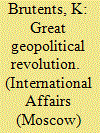

|
|
|
|
|
| Summary/Abstract |
IN A NUTSHELL, our time is best defined as a "time of changes." Changes have spread far and wide to practically all sides of life. They differ in scope and impact from local to unprecedentedly consequential and from political makeup to crucial shifts; they are responsible, to a great and increasing degree, for the image of the present and for our future.
|
|
|
|
|
|
|
|
|
|
|
|
|
|
|
|
| 16 |
ID:
172498
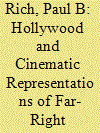

|
|
|
|
|
| Summary/Abstract |
This article argues that a major influence on the imagery of far-right terrorism in the United States derives from cinema. Most of the feature films released by Hollywood on this theme have been rather superficial and have rarely strayed beyond portraying right-wing terrorist movements in popular genres such as westerns, crime thrillers, and romantic melodramas—although not, interestingly, action adventure movies, so often the terrain for narratives involving external terrorist movements. The article contends that U.S. far-right terrorism before the 1990s was anchored in the films depicting the Ku Klux Klan; more recently, a few films have begun to engage with “new” forms of far-right terrorism involving skinheads, neo-Nazis, and “patriot” militias. Overall, remarkably few films released by Hollywood have engaged with the structure of far-right terrorist movements or the motivations of their followers. This has ensured that the movements remained shadowy organizations run, for the most part, by two-dimensional and stereotypical characters.
|
|
|
|
|
|
|
|
|
|
|
|
|
|
|
|
| 17 |
ID:
190667
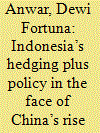

|
|
|
|
|
| Summary/Abstract |
Indonesia regards the shift in the center of economic gravity to Asia, marked by the rise of China and India following the earlier Asian tigers, as a welcome phenomenon that can benefit its own economic development. However, while celebrating the economic dynamism of the Indo-Pacific region, Indonesia also views with great concern China’s assertiveness in pursuing its claims over the whole of the South China Sea, as well as the re-emergence of major power rivalry, particularly between the United States and China as the incumbent and ascending superpower respectively, which can disrupt regional stability and prosperity. With its ‘free and active’ foreign policy doctrine Indonesia adheres to non-alignment, and as a matter of principle does not take sides in any great power competition. Indonesia’s policy in managing regional uncertainty which offers both opportunities for cooperation and threats of conflicts can best be described as hedging plus to ensure both its strategic autonomy and agency. It entails engaging all sides to maximize benefits while mitigating risks at both the national level and through ASEAN. At the same time, as the world’s largest archipelagic state straddling the Indian and the Pacific oceans, and the largest member of ASEAN, Indonesia carries out middle-power diplomacy by playing a leading role in promoting ASEAN-centric inclusive and cooperative wider East Asian multilateralism, helping to shape both the institutional and normative pillars of the International Order in the Indo-Pacific.
|
|
|
|
|
|
|
|
|
|
|
|
|
|
|
|
| 18 |
ID:
160251
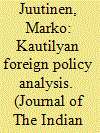

|
|
|
|
|
| Summary/Abstract |
This article evaluates and interprets Kautilya’s Arthasastra – an ancient Sanskrit treatise on statecraft and foreign policy – as a framework for analyzing the conflicting dynamics in a pluralistic order. Second, it operationalizes Arthasastra as an analysis of Sino-Indian dynamics in South Asia and the Indian Ocean region. In examining Kautilya’s political theory, the article answers the perceived need for non-Western international relations theory. A theoretical contribution of the analysis of Kautilya includes an understanding that even inferior powers can become leaders in international affairs and that the precondition of sustainable leadership is the welfare of all subjects of government. Thus, Kautilya appears as an untapped source for conceptualizing international relations in a post-hegemonic order and provides a normative background for rethinking how to manage conflicts. On an empirical level, the article discusses the problem of China’s membership in the South Asian Association for Regional Cooperation (SAARC), as well as the economic, military and political implications of the Belt and Road Initiative for India and the Indian Ocean Region. The article proposes SAARC + 1, Indian active engagement with the Bangladesh–China–India–Myanmar Economic Corridor and the initiation of investment, connectivity and infrastructure projects through the Quad.
|
|
|
|
|
|
|
|
|
|
|
|
|
|
|
|
| 19 |
ID:
085915
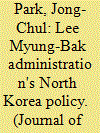

|
|
|
|
|
| Publication |
2008.
|
| Summary/Abstract |
This paper reviews the features of the "policy of Mutual Benefits and Common Prosperity" and its feasibility, as well as, a comparative retrospective between Lee Myung Bak's North Korea policy and the previous two administrations' Engagement Policies in terms of goal, linkage between politics and economy, economic pragmatism, reciprocity, universal standards, institutional mechanisms, and international cooperation.
|
|
|
|
|
|
|
|
|
|
|
|
|
|
|
|
| 20 |
ID:
085927
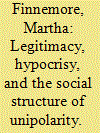

|
|
|
|
|
| Publication |
2009.
|
| Summary/Abstract |
One would think that unipoles have it made.After all, unipolarity is a condition of minimal constraint.Unipoles should be able to do pretty much what they want in the world since, by definition, no other state has the power to stop them.
|
|
|
|
|
|
|
|
|
|
|
|
|
|
|
|
|
|
|
|
|